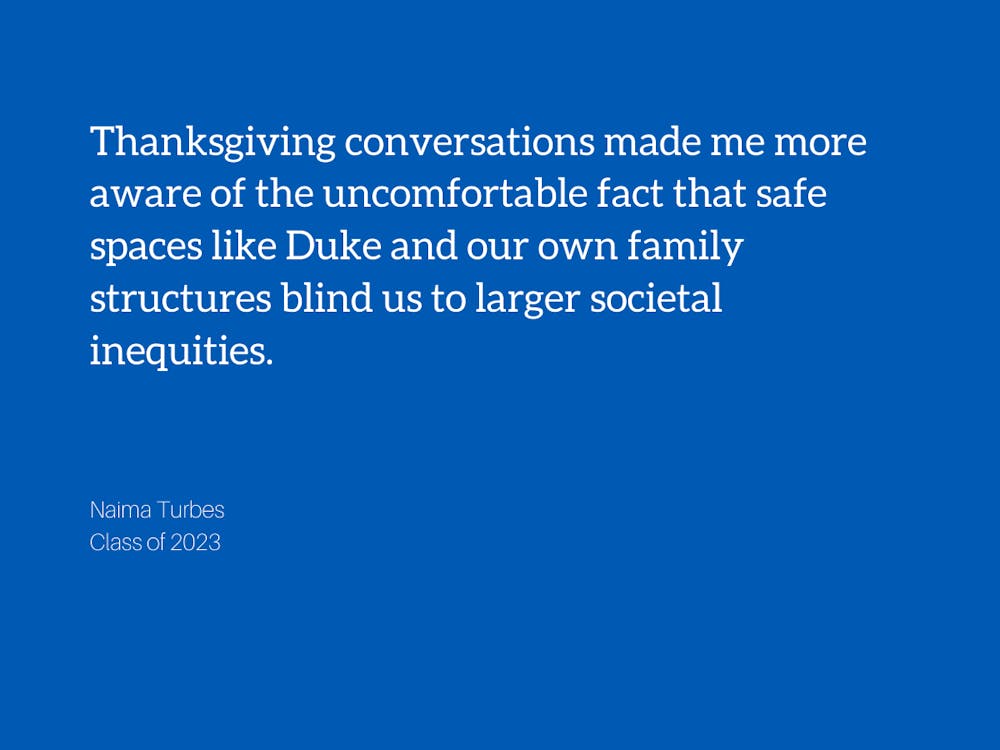What does it mean to see structure and how are we blind to it? Sometimes I feel like all my schooling has been aimed at recognizing and identifying my own blind spots. Racism, elitism, and privilege seem to underlie most of my humanities papers or class discussions.
And for the most part, I have been receptive and eager to understand where our society systematically leaves behind some groups of people and advantages others. In tenth grade, I wrote a blog piece entitled “I Will Not Look Away: College Visits and Educational Disparities” that compared my Northeast college tour with some of the drug and violence issues in public schools near my home in Atlanta. I remember furiously writing on the plane ride home thinking about why some youth have access to significantly better education opportunities? Why is the difference so stark and so closely related to race and socioeconomic status?
“My dad and I found not an array of diverse, prospective students but the same people we encounter in our daily lives. In fact, I ran into 11 students from the private school I attend in the Southeast. This was disheartening and a display of elitism that promises to transcend generations. The same people who currently go to the same schools, have the same social groups, and live in the same neighborhoods will continue in that tradition,” I wrote.
I compared this trip to my work in high schools with students struggling with drug problems. I remember writing about these schools that “My hands shook when I told them what school I attend, and I found myself struggling to connect with their situation.”
I felt overwhelmed with a sense of guilt and shame about the opportunities that I had related to school and educational support systems that these kids lacked for no fault of their own.
In my Duke seminar class about similar education inequalities, I have learned about more empirical and quantitative ways to validate my own feelings of stark education disparities. As seemingly obvious and unfortunate as ideas like education inequality are, the conversations around them are still uncomfortable. People retreat to their own understandings of education or high school experiences. These are when the blind spots start to shine.
Maybe Thanksgiving conversations made me more aware of this hypocrisy. I saw it in myself, a desire to avoid conflict discussing issues in the news when I saw that what I understood and learned on Duke’s campus differed from the life I grew up knowing. I think of conversations I have had with friends and teammates on Duke’s campus where it becomes clear that truths related to race, class, or gender on campus do not translate to their home lives or childhood.
What I do understand is that as uninspiring and counterintuitive as it is, often skepticism is our greatest tool in identifying and these blind spots. We must be willing to challenge and sometimes leave behind the lessons that our parents or close relatives give. To allow the idea that an experience that a friend from across the country has to contribute is just as valid as your aunt. Otherwise, narratives about cultural deficiency or lack of work ethic work to support our blind spots and facilitate a misunderstanding and lack of respect for people and systemic issues.
There is a difference, I have noticed, between calling out structural inequalities in a class discussion versus taking action in real life. What irks me the most is my own ending to the blog post I wrote many years ago. I said, “And now that I see this, I plan to be part of the solution, and not the passive part of the problem. I will not look away.”
But how have I been “part of the solution?" I have found it embarrassingly easy to ride the advantages presented by attending Duke and forget about those I leave behind in my own community and surrounding communities. What makes it so easy to call out the problem and so hard to act on it?
I almost feel like learning about the deep rooted and structural causes of inequalities makes me more pessimistic about my ability to create any real change. It becomes easy and appealing to hold onto contradicting anecdotal information that tells us factors like racism or sexism or elitism do not play a large role in our society just because they seem to big to fight.
I write this all without a clear answer or way forward but as a loving reminder to my friends, my peers, and myself to not let frustrations, guilt, or regret feed the blindness.
Naima Turbes is a Trinity first-year. Her column, “mind over matter,” typically runs on alternate Tuesdays.
Get The Chronicle straight to your inbox
Signup for our weekly newsletter. Cancel at any time.

